SME Fundamentals: Our Experts’ Guide To Recovery And Resilience
We share tips directly from a diverse range of Asia SMEs on COVID business solutions – and how to bring your products to new global audiences.
Whether you’re shipping saffron or selling shoes, the diversity and scale of small businesses in Asia is immense. This monumental scope - especially when you consider mega-markets like India and China – has made the region one of the most successful SME launchpads in the world.
And the possibilities just keep on multiplying. Growth projections – particularly for e-commerce, continue to rise. This, in spite of – or in many cases because of – the global pandemic.
What makes the region particularly exciting? In the retail space, rich diversity of culture is reflected in product offerings - everything from artisan textiles to bountiful agricultural wares.
Super-accelerated digitization is driving growth too, helping smart SMEs to leapfrog into new markets. To add, the opportunities for global, Asia-Europe and intra-Asia trade can’t be ignored, especially those that are further fuelled by recent free trade agreements: a boost to all businesses looking to expand globally.
FedEx has supported small and medium businesses in Asia Pacific for decades. We’ve long been in a unique and exciting position; seeing SMEs in all kinds of sectors catapult from local, domestic enterprises to serious international players.
We’ve watched innovation unfold all around us - and are proud to have been part of so many success stories. We’ve witnessed extraordinary feats of grit and resilience from Asian small and medium enterprises (SMEs); not least in the last 18 months, as owners and operators have fought to stay afloat and maintain business continuity amid a pandemic. We have remained agile and responsive, providing COVID-19 business solutions to help small businesses not only pivot but flourish in their business recovery efforts.
Our experience supporting SMEs in Asia through endless growth and recovery cycles can lend some crucial learnings for businesses of all sizes. This is the inside track on the small business heroes that have made a lasting impression on not just us, but their local communities and customers.
We hope that your own small business can benefit from the business insights below.
And the possibilities just keep on multiplying. Growth projections – particularly for e-commerce, continue to rise. This, in spite of – or in many cases because of – the global pandemic.
What makes the region particularly exciting? In the retail space, rich diversity of culture is reflected in product offerings - everything from artisan textiles to bountiful agricultural wares.
Super-accelerated digitization is driving growth too, helping smart SMEs to leapfrog into new markets. To add, the opportunities for global, Asia-Europe and intra-Asia trade can’t be ignored, especially those that are further fuelled by recent free trade agreements: a boost to all businesses looking to expand globally.
FedEx has supported small and medium businesses in Asia Pacific for decades. We’ve long been in a unique and exciting position; seeing SMEs in all kinds of sectors catapult from local, domestic enterprises to serious international players.
We’ve watched innovation unfold all around us - and are proud to have been part of so many success stories. We’ve witnessed extraordinary feats of grit and resilience from Asian small and medium enterprises (SMEs); not least in the last 18 months, as owners and operators have fought to stay afloat and maintain business continuity amid a pandemic. We have remained agile and responsive, providing COVID-19 business solutions to help small businesses not only pivot but flourish in their business recovery efforts.
Our experience supporting SMEs in Asia through endless growth and recovery cycles can lend some crucial learnings for businesses of all sizes. This is the inside track on the small business heroes that have made a lasting impression on not just us, but their local communities and customers.
We hope that your own small business can benefit from the business insights below.
LESSON 1: BELIEVE IN YOUR PRODUCT
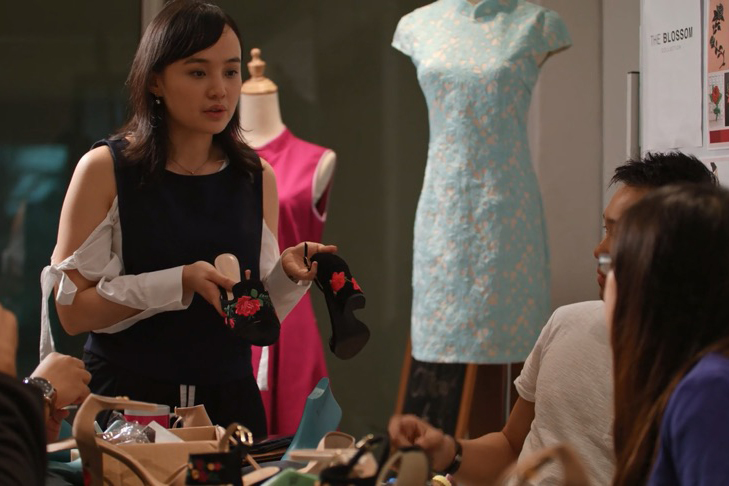
Christy Ng always dreamed of having her own shoe label.
Starting from scratch, it was her unwavering belief in her product – and its appeal to her target audience – that saw her succeed. With humble beginnings in her mother’s living room, Christy began her foray in the footwear industry by importing shoes from neighboring countries and then selling them in the Malaysian market. Guided by her keen sense of style and her desire to turn every woman’s shoe fantasy into reality, Christy started designing her own shoes and went on to engage a shoemaker to bring her designs to life.
She quickly identified 2 gaps in the market: access and availability.
1) Malaysian consumers didn’t have access to mainstream brands
2) No brand offered product availability 24 hours a day, 365 days a year
She wanted her designs to be available round the clock. When her own shoe designs went unexpectedly viral on social media in 2010, her online shoe company was born, and the rest is history. Today Christy Ng Shoes is a household name in Malaysia. Every pair is designed and hand-crafted by Christy and her team of shoe designers. The company continues to gain market presence, and with increasing customer demand, the product range now includes exclusive bridal footwear, accessories and handbags.
She quickly identified 2 gaps in the market: access and availability.
1) Malaysian consumers didn’t have access to mainstream brands
2) No brand offered product availability 24 hours a day, 365 days a year
She wanted her designs to be available round the clock. When her own shoe designs went unexpectedly viral on social media in 2010, her online shoe company was born, and the rest is history. Today Christy Ng Shoes is a household name in Malaysia. Every pair is designed and hand-crafted by Christy and her team of shoe designers. The company continues to gain market presence, and with increasing customer demand, the product range now includes exclusive bridal footwear, accessories and handbags.
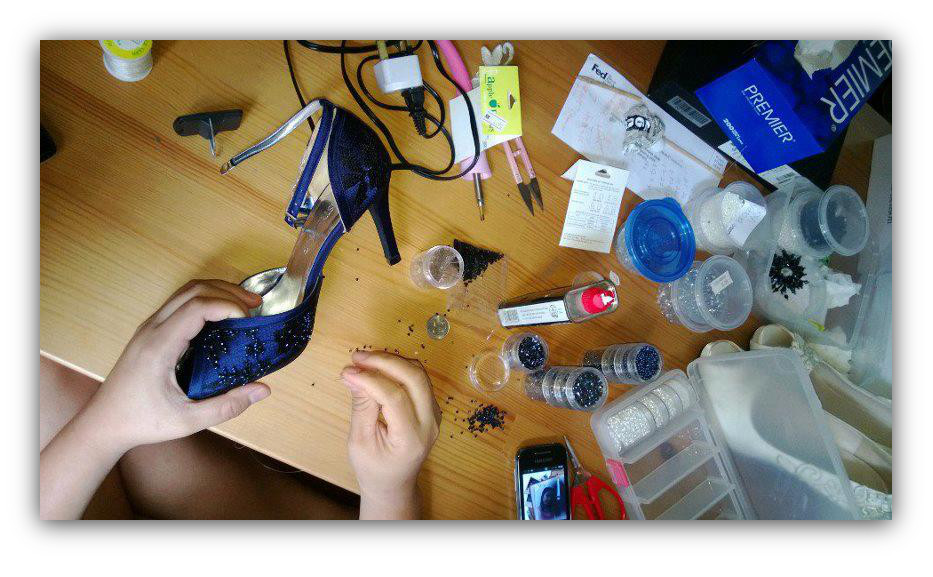
For Christy, her vision has been to make unique, exceptional, quality footwear available to all women at affordable prices. Thinking beyond her domestic market, Christy set her sights on growing her small, local-based business to wider geographies, targeting customers from all around the world. Today, her website sells in major economies including Singapore, USA, Australia, UK and Europe. Shoes are available at the click of a button, with highest online sales driven by social commerce i.e. Instagram and Facebook, which pressed forward with the launch of Facebook Shops. Now, budding Asian SMEs take for granted their ability to launch social commerce platforms at the touch of a button, but today’s level of supply chain intelligence wasn’t available to Christy when she started out.
Despite today’s easy access to mobile-first fashion e-tail platforms such as Carousell and DePop, Christy continues to place brand value on brick-and-mortar. Her e-commerce business recently came full circle, with flagship stores opening in Malaysia to offer in-person experiential option to loyal customers.
Despite today’s easy access to mobile-first fashion e-tail platforms such as Carousell and DePop, Christy continues to place brand value on brick-and-mortar. Her e-commerce business recently came full circle, with flagship stores opening in Malaysia to offer in-person experiential option to loyal customers.
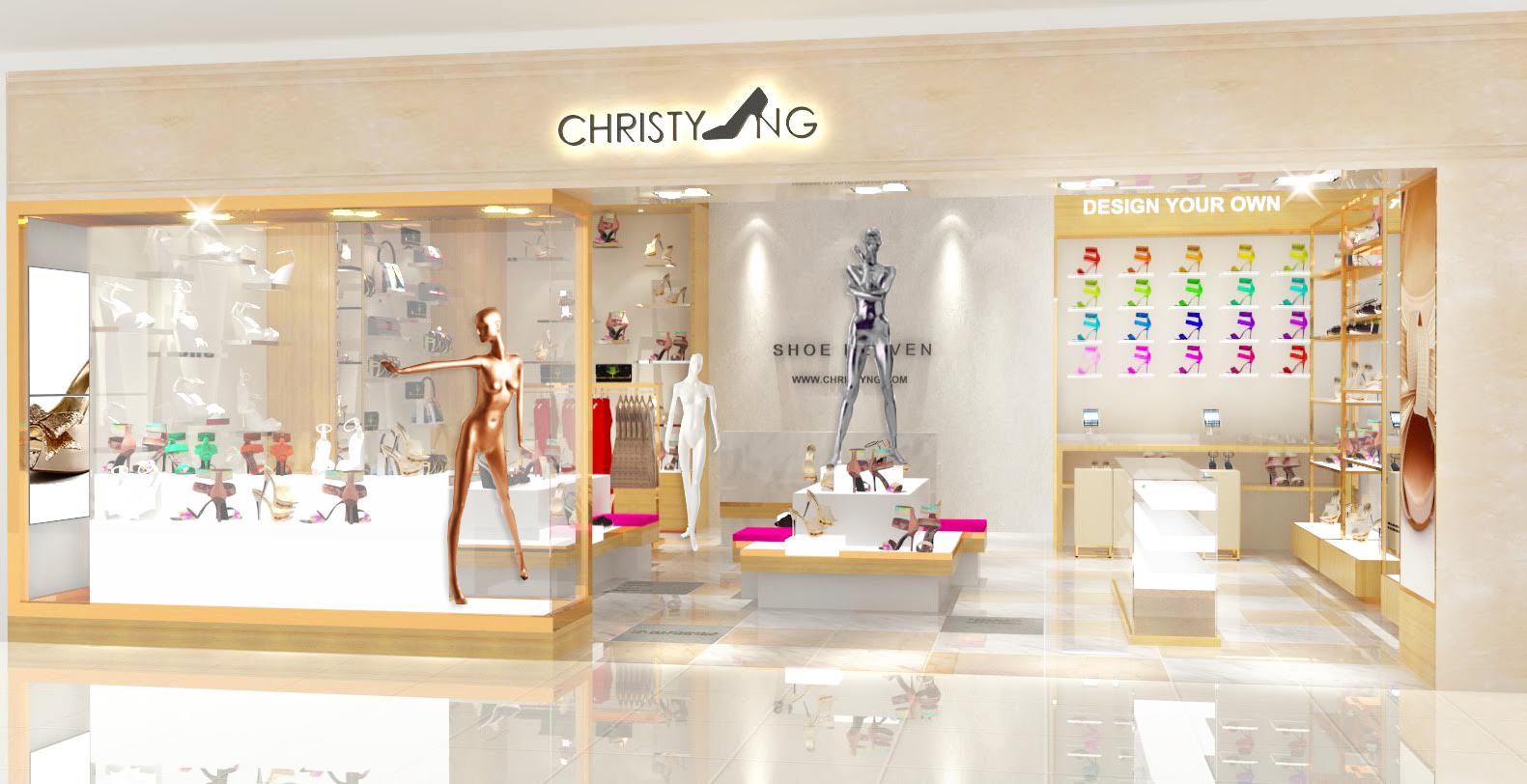
The online retail fashion industry has also evolved over the years, and Christy recognizes that speed, flexibility and seamless service are equally critical factors for her success. As an e-tailer, it is important to Christy that products are delivered on time and in flawless condition. Equally as important is the cost of shipping the products to her customers. That’s where logistics comes in.
FedEx has been supporting Christy Ng Shoes since 2010. For more than a decade, we’ve watched this fast-growing company realize its ambitions and expand its business by providing consumers with reliable, time-definite delivery.
FedEx helped Christy meet her customers’ varied demands using the FedEx PAK and FedEx Extra Large Pak (XL Pak), designed especially for the garment and fashion industry. According to Christy, FedEx PAK is perfect for packing and transporting shoes while the XL Pak allows more flexibility to pack different types of shoes in bigger boxes, as well as bundling them to achieve higher sales volumes. She also uses FedEx International Economy Service for less urgent shipments, which allows her to trade time for savings.
Innovative solutions combined with outstanding customer service and quality sales support are the primary reasons why Christy Ng Shoes remains a loyal FedEx cross-border customer. With the support of FedEx, Christy is now focused on continually growing her business in three key overseas markets – USA, Singapore and Australia – with plans to expand to Japan in the near future.
“There are so many different customs procedures in each country, especially in terms of product classification and taxes,” says Christy. “I now find that shipping to America and Australia, for example, is easy, and FedEx helps me to clear my products through customs quickly and with minimum cost.”
One of the challenges Christy also had to overcome was making big decisions on what new product lines to invest in. There is a risk involved in expanding your offering from a core product line to new, untested products that may or may not sell. If you’re weighing up what it takes to do this, check out Christy’s business insights for diversifying here:
FedEx has been supporting Christy Ng Shoes since 2010. For more than a decade, we’ve watched this fast-growing company realize its ambitions and expand its business by providing consumers with reliable, time-definite delivery.
FedEx helped Christy meet her customers’ varied demands using the FedEx PAK and FedEx Extra Large Pak (XL Pak), designed especially for the garment and fashion industry. According to Christy, FedEx PAK is perfect for packing and transporting shoes while the XL Pak allows more flexibility to pack different types of shoes in bigger boxes, as well as bundling them to achieve higher sales volumes. She also uses FedEx International Economy Service for less urgent shipments, which allows her to trade time for savings.
Innovative solutions combined with outstanding customer service and quality sales support are the primary reasons why Christy Ng Shoes remains a loyal FedEx cross-border customer. With the support of FedEx, Christy is now focused on continually growing her business in three key overseas markets – USA, Singapore and Australia – with plans to expand to Japan in the near future.
“There are so many different customs procedures in each country, especially in terms of product classification and taxes,” says Christy. “I now find that shipping to America and Australia, for example, is easy, and FedEx helps me to clear my products through customs quickly and with minimum cost.”
One of the challenges Christy also had to overcome was making big decisions on what new product lines to invest in. There is a risk involved in expanding your offering from a core product line to new, untested products that may or may not sell. If you’re weighing up what it takes to do this, check out Christy’s business insights for diversifying here:
When it comes to believing in your product, this can also mean having the confidence to turn a hobby into a full-scale business venture.
Take J &Co Jewellery.
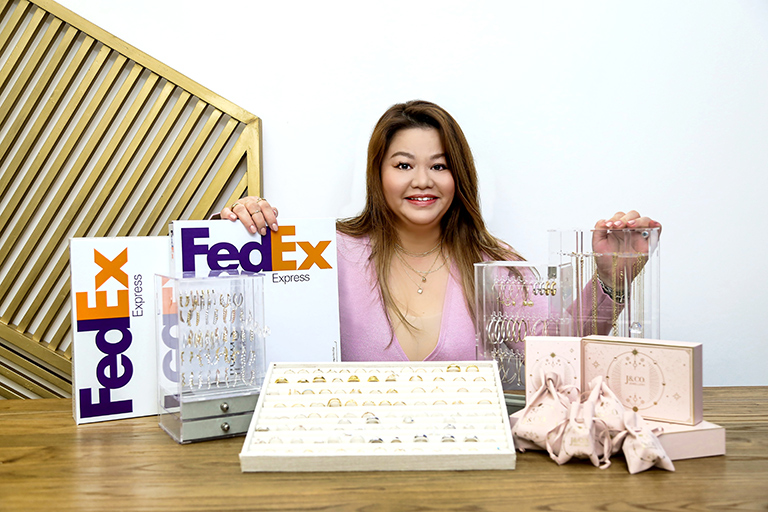
With a full-time job working in fashion, Jenny Kwang, Founder and Creative Director of J&Co Jewellery, starting making jewelry as a fun, after-work hobby. But the hobby grew. What started as a passion project personalizing jewelry designs for friends and family has today grown into an online store with global reach – bringing beautifully crafted creations from Singapore to customers in international markets, powered by an easy to use website and a strong international logistics network.
“It was really a hobby at first, as I found it difficult to find jewelry that was good quality and lasting, yet affordable – so I thought about trying out making them on my own. I started selling my creations at a marketplace in the US and on Etsy, and surprisingly, many customers loved them, and word spread far and wide”, shares Jenny.
Today, this story and the products have touched the hearts of many around the world and J&Co is reaching people with their unique, contemporary designs that are timeless yet minimal and suitable for everyday wear.
“We are really here to create an inclusive community, one where our customers don’t have to break the bank to access a well-crafted necklace or pair of earrings”, added Jenny. “Our conversations with women from all walks of life inspire us, and they come back and spread the word because they feel beautiful wearing the items we create.”
“It was really a hobby at first, as I found it difficult to find jewelry that was good quality and lasting, yet affordable – so I thought about trying out making them on my own. I started selling my creations at a marketplace in the US and on Etsy, and surprisingly, many customers loved them, and word spread far and wide”, shares Jenny.
Today, this story and the products have touched the hearts of many around the world and J&Co is reaching people with their unique, contemporary designs that are timeless yet minimal and suitable for everyday wear.
“We are really here to create an inclusive community, one where our customers don’t have to break the bank to access a well-crafted necklace or pair of earrings”, added Jenny. “Our conversations with women from all walks of life inspire us, and they come back and spread the word because they feel beautiful wearing the items we create.”
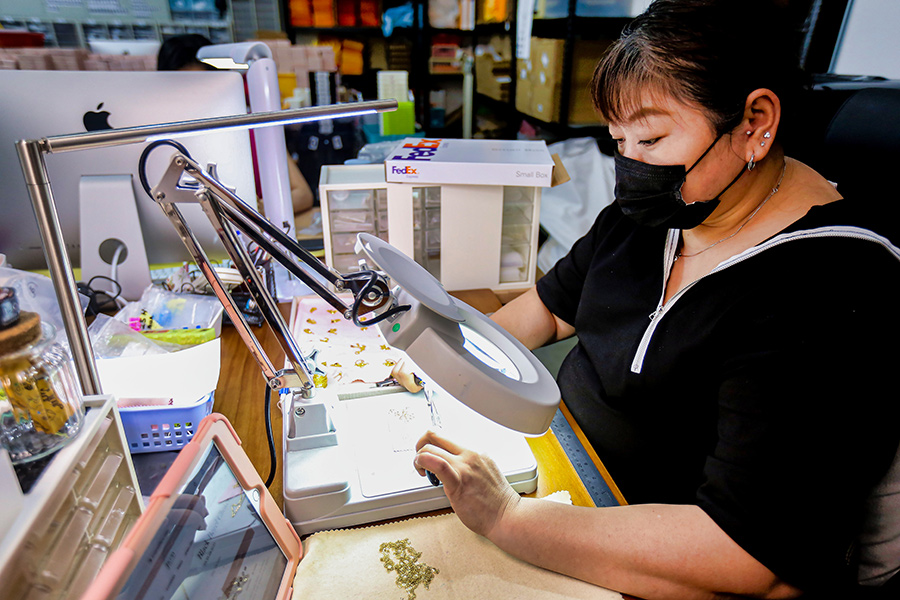
When the business popularity soared, scaling up was imminent and exciting. This also meant finding the right delivery partner – a crucial step to ensuring that orders were met and each delivery experience was nothing short of excellent. This was especially important during peak shipping season – such as Christmas, Black Friday and Lunar New Year.
“Finding the right global logistics provider was very important to us, and we needed one that was reliable and could ship everywhere.” shared Jenny. Packages needed to arrive promptly and be handled safely and without damage.
“Customers come to shop on our website from all over the world – starting from the US, then Japan, Switzerland, Australia, the Netherlands and Singapore. Once they place the order, they expect delivery to be prompt and made with zero damage to the product – a universal customer need.”
As an e-commerce business embracing digitalization to better serve their young customers, Jenny found that the innovative digital tools offered by FedEx were very useful. In particular, FedEx® Electronic Trade Documents (ETD) ensured smoother customs clearance processes, as J&Co could process international deliverables electronically, with paperless invoices. FedEx Delivery Manager® also allows customers to keep track of their packages, arrange to pick them up nearby location and get delivery notifications, amongst other tracking services – all done digitally at one’s fingertips.
“Finding the right global logistics provider was very important to us, and we needed one that was reliable and could ship everywhere.” shared Jenny. Packages needed to arrive promptly and be handled safely and without damage.
“Customers come to shop on our website from all over the world – starting from the US, then Japan, Switzerland, Australia, the Netherlands and Singapore. Once they place the order, they expect delivery to be prompt and made with zero damage to the product – a universal customer need.”
As an e-commerce business embracing digitalization to better serve their young customers, Jenny found that the innovative digital tools offered by FedEx were very useful. In particular, FedEx® Electronic Trade Documents (ETD) ensured smoother customs clearance processes, as J&Co could process international deliverables electronically, with paperless invoices. FedEx Delivery Manager® also allows customers to keep track of their packages, arrange to pick them up nearby location and get delivery notifications, amongst other tracking services – all done digitally at one’s fingertips.
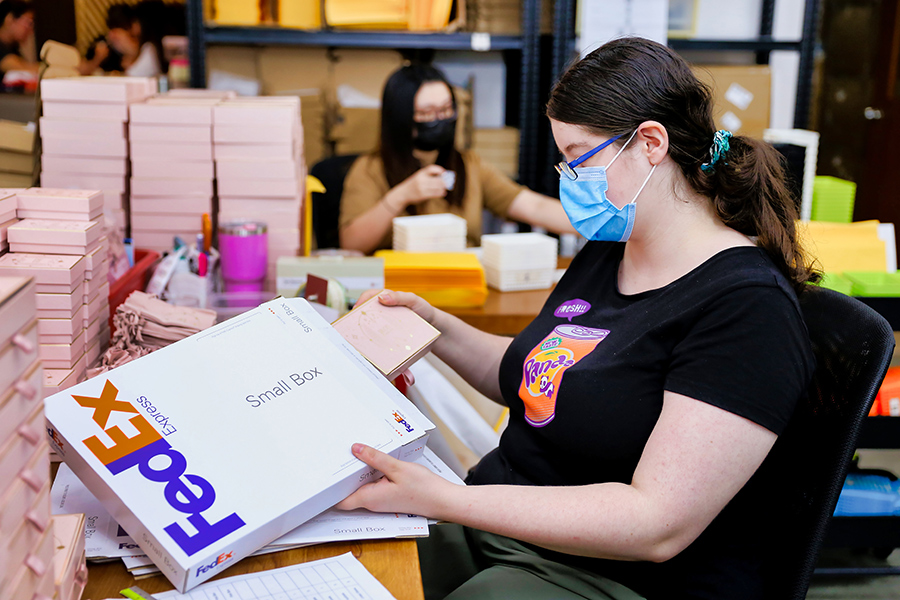
Jenny is ready to embrace technology further – from using more automation in production, to integrating it into order fulfilment and shipping. With COVID-19 restrictions, e-commerce is a prime avenue for retailers, and more can be done to improve efficiency and better serve the needs of jewelry lovers worldwide.
Bringing her vision forward with her community of customers and the right partners, Jenny continues to forge ahead and fulfil her ongoing dreams of creating jewelry that people love, with something for everyone.
Bringing her vision forward with her community of customers and the right partners, Jenny continues to forge ahead and fulfil her ongoing dreams of creating jewelry that people love, with something for everyone.
LESSON 2: FIND YOUR AUDIENCE ON SOCIAL MEDIA
Lockdowns have shown that we are spending more and more time on social media. And the more time we spend on social media, the more we tend to shop. Captive audiences are ready to be tapped, with the right social and digital strategy. Social platforms like Instagram are tailor-made for showcasing consumer products in lifestyle, fashion and accessories sectors. Take What? Caps.
Filipino advertising firm Eggshell Worldwide, led by Mark Wesley Pahate, wanted to ensure that the strategies they employ in a dynamic digital landscape were sound, effective, and properly tested. So they launched their own fashion brand, What? Caps, to see if they could successfully sell their own product line – and glean some real-life business insights to share with their own clients.
“Since I’m a fan of streetwear, we decided to go with specifically styled fitted caps,” Pahate shares.
Streetwear has proven itself appealing to both young and the old, rising from a do-it-yourself (DIY) aesthetic and a community of surfers, skaters, artists, and musicians. In the Philippines, What? Caps has generated buzz among the youth who want to express themselves through fashion.
“Internationally, it is a really big market, valued around $300 billion and growing,” Pahate says, “Young people drawn to streetwear comprise a vibrant community and an evolving hub of creativity. You will be surprised by a lot of independent streetwear brands we have here in the Philippines, and how popular they are in the international market.”
Neighboring streetwear hubs Taiwan and Singapore are the biggest markets for What? Caps. “Our products appeal to the two markets we identified for What? Caps: Streetwear fans and cap collectors.” Pahate shares. “We connect with customers through social media. From there, we lead them to our website where they can shop.”
Filipino advertising firm Eggshell Worldwide, led by Mark Wesley Pahate, wanted to ensure that the strategies they employ in a dynamic digital landscape were sound, effective, and properly tested. So they launched their own fashion brand, What? Caps, to see if they could successfully sell their own product line – and glean some real-life business insights to share with their own clients.
“Since I’m a fan of streetwear, we decided to go with specifically styled fitted caps,” Pahate shares.
Streetwear has proven itself appealing to both young and the old, rising from a do-it-yourself (DIY) aesthetic and a community of surfers, skaters, artists, and musicians. In the Philippines, What? Caps has generated buzz among the youth who want to express themselves through fashion.
“Internationally, it is a really big market, valued around $300 billion and growing,” Pahate says, “Young people drawn to streetwear comprise a vibrant community and an evolving hub of creativity. You will be surprised by a lot of independent streetwear brands we have here in the Philippines, and how popular they are in the international market.”
Neighboring streetwear hubs Taiwan and Singapore are the biggest markets for What? Caps. “Our products appeal to the two markets we identified for What? Caps: Streetwear fans and cap collectors.” Pahate shares. “We connect with customers through social media. From there, we lead them to our website where they can shop.”
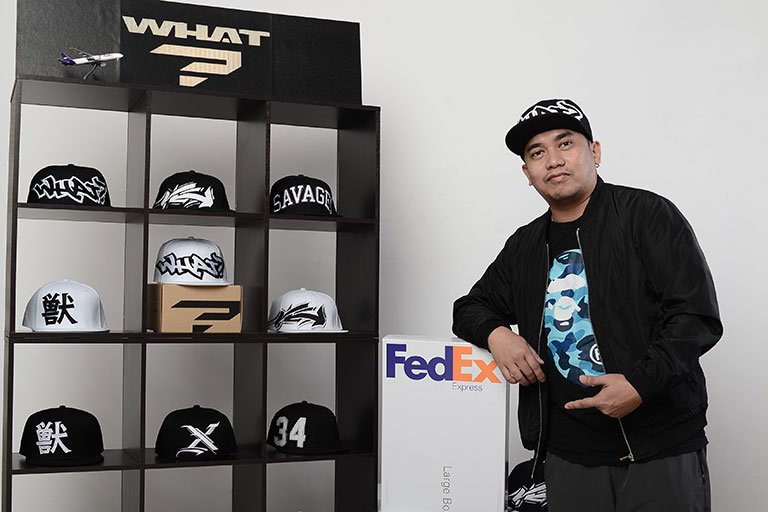
The What? Caps website is integrated with the FedEx shipping system, ensuring secure and fast delivery to over 220 countries and territories. For any brand, it is a badge of success to cross borders. After steadily gaining traction in Southeast Asia and the Middle East, Pahate shares how they are beginning to penetrate the USA. This increase in demand and destinations, he says, was made possible by their logistics provider.
“FedEx was willing to work with us and install the FedEx system into our website even though we were only a fledgling small business. They were the only logistics company who gave us the same treatment that large companies receive,” he added. Because of the availability of FedEx services on the What? website, buyers can preview the total cost of the merchandise they are purchasing including shipping fees. This feature is what Pahate deems most important.
“No one likes surprises. It pays to have a system that will do all the math for you,” he states. With a number of delivery options available in the website, What? Caps customers find it easy to choose the one that best suits their needs.
Integrating the FedEx shipping service on a company’s website guarantees a smooth end-to-end transaction, decreasing cart abandonment. This is a tangible boost for micro-, small- and medium-sized enterprises (MSMEs) exploring the possibility of reaching more markets beyond their borders. Tapping the supply chain intelligence of your logistics provider is always a win – especially when starting out.
Pahate plans to venture into other streetwear staples such as hoodies, socks, and shoes, with the vision to grow into a full-blown lifestyle brand. For their social media fans, new drops and exclusive collectibles only helps to build their brand’s success.
Another Asian accessories brand started by one founder with an intuitive understanding of the social media landscape is Klasse 14.
“Klasse14 has secured a place in the market because we are not a typical, conventional watch company” shares creative director and co-founder Mario Nobile.
“We are a fashion and lifestyle brand instead. Our target customers are bold, digital native millennials. Social media is then an ideal platform to connect with them. Apart from our dedication to bringing forth impressive designs, collaboration is another strategy we adopted. We seek to inject new perspectives and unexpected creations through partnership with other brands and designers,” Mario shared.
By launching social media engagement campaigns to promote the idea that “that everyone is born to be unique and has their own personalities, talents and passion” Klasse 14 is able to target niche demographics with a wide range of products to suit all tastes.
After spending more than ten years as a jewelry designer in Europe, Mario decided to start a new adventure in 2014 – moving to Hong Kong and designing watches. Having an enthusiasm for creating stories around the wrist, Mario founded Klasse14 with his business partners. Ever since then, the brand has established a strong presence, both online and offline, in Hong Kong, Japan, mainland China, Malaysia, South Korea, Thailand, Taiwan and the U.S.
“FedEx was willing to work with us and install the FedEx system into our website even though we were only a fledgling small business. They were the only logistics company who gave us the same treatment that large companies receive,” he added. Because of the availability of FedEx services on the What? website, buyers can preview the total cost of the merchandise they are purchasing including shipping fees. This feature is what Pahate deems most important.
“No one likes surprises. It pays to have a system that will do all the math for you,” he states. With a number of delivery options available in the website, What? Caps customers find it easy to choose the one that best suits their needs.
Integrating the FedEx shipping service on a company’s website guarantees a smooth end-to-end transaction, decreasing cart abandonment. This is a tangible boost for micro-, small- and medium-sized enterprises (MSMEs) exploring the possibility of reaching more markets beyond their borders. Tapping the supply chain intelligence of your logistics provider is always a win – especially when starting out.
Pahate plans to venture into other streetwear staples such as hoodies, socks, and shoes, with the vision to grow into a full-blown lifestyle brand. For their social media fans, new drops and exclusive collectibles only helps to build their brand’s success.
Another Asian accessories brand started by one founder with an intuitive understanding of the social media landscape is Klasse 14.
“Klasse14 has secured a place in the market because we are not a typical, conventional watch company” shares creative director and co-founder Mario Nobile.
“We are a fashion and lifestyle brand instead. Our target customers are bold, digital native millennials. Social media is then an ideal platform to connect with them. Apart from our dedication to bringing forth impressive designs, collaboration is another strategy we adopted. We seek to inject new perspectives and unexpected creations through partnership with other brands and designers,” Mario shared.
By launching social media engagement campaigns to promote the idea that “that everyone is born to be unique and has their own personalities, talents and passion” Klasse 14 is able to target niche demographics with a wide range of products to suit all tastes.
After spending more than ten years as a jewelry designer in Europe, Mario decided to start a new adventure in 2014 – moving to Hong Kong and designing watches. Having an enthusiasm for creating stories around the wrist, Mario founded Klasse14 with his business partners. Ever since then, the brand has established a strong presence, both online and offline, in Hong Kong, Japan, mainland China, Malaysia, South Korea, Thailand, Taiwan and the U.S.

Mario sees the importance of choosing a reliable logistics provider in order to create a promising shopping experience for customers. This is how Klasse14 gains trust from customers and build long-term relations with them.
When asked about what advice he would give to small businesses and entrepreneurs, Mario said the most important thing is to believe in what you do. “You have to be clear about your goals, and be resilient and patient on the way to achieving them,” Mario added.
When asked about what advice he would give to small businesses and entrepreneurs, Mario said the most important thing is to believe in what you do. “You have to be clear about your goals, and be resilient and patient on the way to achieving them,” Mario added.
LESSON 3: TAKE ADVANTAGE OF TIMING
Timing is crucial for many small businesses, but when you are moving PPE or healthcare products – especially cold chain logistics - every second counts.
Australian-owned and operated Ascend Surgical and Medical (ASM) and Greta Grossberg’s company, Sanical, are two key players in helping protect Australia’s healthcare industry by providing a wide range of medical accessories including face masks, surgical gowns and hand sanitisers.
Managing deliveries across the supply chain is crucial to both ASM and Sanical’s ability to provide their products to hospitals, healthcare professionals, elderly care facilities, general practitioners and day procedure centers. Deliveries must be coordinated and made within the allocated time to their distribution networks. It’s no surprise that they require complete visibility of orders from the moment they are placed, right through to the time they are delivered.
Australian-owned and operated Ascend Surgical and Medical (ASM) and Greta Grossberg’s company, Sanical, are two key players in helping protect Australia’s healthcare industry by providing a wide range of medical accessories including face masks, surgical gowns and hand sanitisers.
Managing deliveries across the supply chain is crucial to both ASM and Sanical’s ability to provide their products to hospitals, healthcare professionals, elderly care facilities, general practitioners and day procedure centers. Deliveries must be coordinated and made within the allocated time to their distribution networks. It’s no surprise that they require complete visibility of orders from the moment they are placed, right through to the time they are delivered.
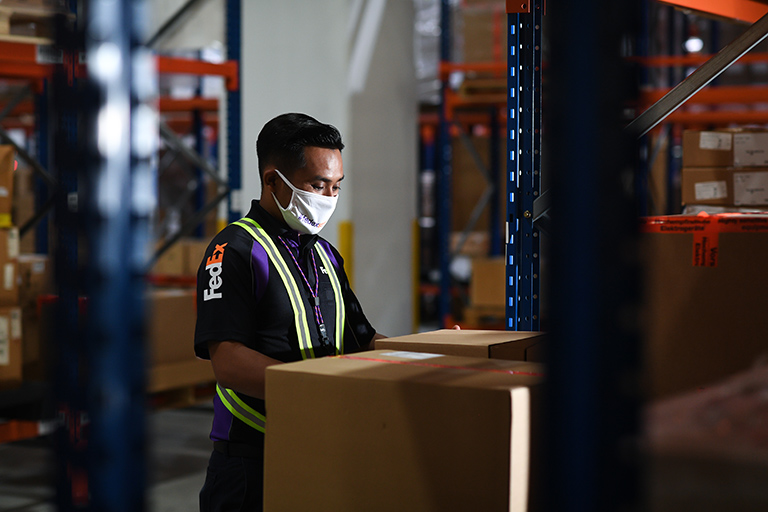
With current restrictions on air cargo movements, ASM and Sanical needed an end-to-end solution to reliably move heavy shipments of PPE. To help fulfil the demand and deliver essential medical accessories, ASM and Sanical chose FedEx to safely deliver heavy weight shipments from door to door.
To move PPE to where it is desperately needed, healthcare logistics companies need to mitigate challenges. Given the shipment involved PPE, ASM and Sanical were required to undertake a pre-audit and declare the shipment to customs as they moved their products from both China and Cambodia into Sydney. With the support of FedEx, the teams worked closely to ensure that they received the necessary customs approvals that allowed them to move the shipment seamlessly into Australia.
To move PPE to where it is desperately needed, healthcare logistics companies need to mitigate challenges. Given the shipment involved PPE, ASM and Sanical were required to undertake a pre-audit and declare the shipment to customs as they moved their products from both China and Cambodia into Sydney. With the support of FedEx, the teams worked closely to ensure that they received the necessary customs approvals that allowed them to move the shipment seamlessly into Australia.
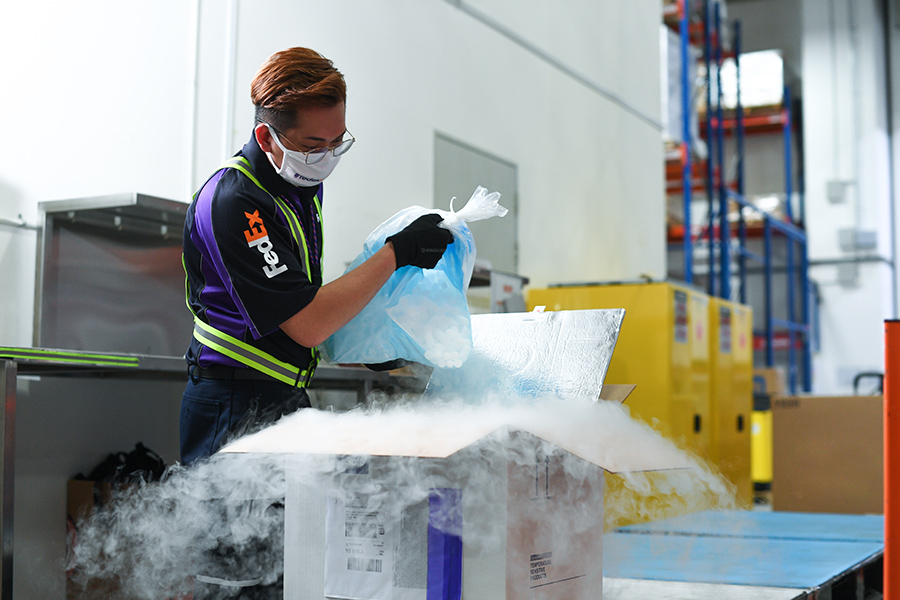
FedEx international network, world class fleet, logistics expertise and capabilities allowed for the crucial shipment to move efficiently and reliably across the globe and reach its destination on time. Reduced handling costs, service reliability and first-class customer support played a critical role in the quick delivery of ASM and Sanical’s supplies vitally needed by doctors, nurses and aged-care workers in Australia.
Healthcare companies like ASM and Sanical are rapidly fine-tuning their logistics strategies to ensure that deliveries are time-definite. But for other companies that aren’t shipping critical or life-saving items, timing can also be crucial. Seizing the moment and capitalizing on make-or-break moments can really push your business forward.
Step forward Consummare. Manufacturing luxury packaging has been Consummare’s expertise since 1994, but Consummare was established through a predecessor called Exquisite, which specialized in manufacturing jewelry boxes.
In 2008, the owners of Exquisite decided to cease operations. “The British owners pulled out, but they offered to turn over Exquisite’s assets,” reminisces Ralen Yco, President and CEO of Consummare. It was a pivotal moment. It was no easy decision – but it was one that needed to be made fast. Taking advantage of the unique timing and circumstance, Yco took on the opportunity and started Consummare, Inc., as a fully female-led company in 2009.
Healthcare companies like ASM and Sanical are rapidly fine-tuning their logistics strategies to ensure that deliveries are time-definite. But for other companies that aren’t shipping critical or life-saving items, timing can also be crucial. Seizing the moment and capitalizing on make-or-break moments can really push your business forward.
Step forward Consummare. Manufacturing luxury packaging has been Consummare’s expertise since 1994, but Consummare was established through a predecessor called Exquisite, which specialized in manufacturing jewelry boxes.
In 2008, the owners of Exquisite decided to cease operations. “The British owners pulled out, but they offered to turn over Exquisite’s assets,” reminisces Ralen Yco, President and CEO of Consummare. It was a pivotal moment. It was no easy decision – but it was one that needed to be made fast. Taking advantage of the unique timing and circumstance, Yco took on the opportunity and started Consummare, Inc., as a fully female-led company in 2009.
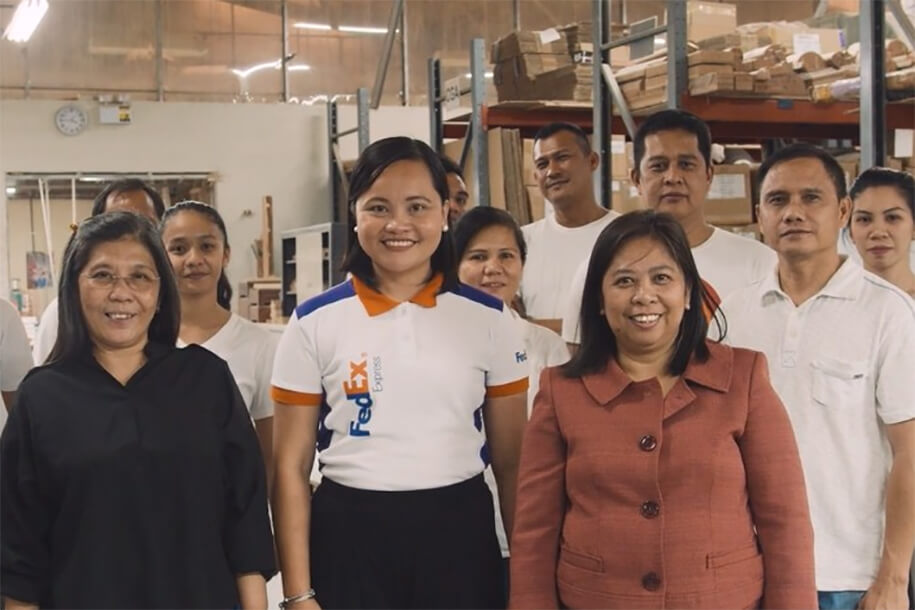
Of course, with the rise of personalization in retail and e-commerce merchants striving to stand out to their customers, packaging has become more and more important over the last decade as e-commerce has exploded. But Consummare have been ahead of this curve and long found their niche. Packaging is their product.
In 2009, Yco and Vice President Angelina Ela decided to use their takeover to steer the business in a new direction. “Jewelry boxes were not profitable because consumers don’t purchase them as frequently. With Consummare, we diversified our portfolio and concentrated on producing packaging for cigars, wine, and premium chocolates,” Yco shares.
The company specialize in laminated wooden boxes, and their services cover all aspects of packaging design, from developing the structure to manufacturing the products. As a small team of 33 employees, Consummare takes in a limited number of projects at a time and trains each member of their manufacturing team to be skilled in every aspect of production.
In 2009, Yco and Vice President Angelina Ela decided to use their takeover to steer the business in a new direction. “Jewelry boxes were not profitable because consumers don’t purchase them as frequently. With Consummare, we diversified our portfolio and concentrated on producing packaging for cigars, wine, and premium chocolates,” Yco shares.
The company specialize in laminated wooden boxes, and their services cover all aspects of packaging design, from developing the structure to manufacturing the products. As a small team of 33 employees, Consummare takes in a limited number of projects at a time and trains each member of their manufacturing team to be skilled in every aspect of production.

The company’s portfolio boasts of several prominent global brands, based in Switzerland, Germany, the UK, and the USA. “We produce cigar accessories, watch boxes, eyewear boxes for several legacy brands,” Yco says. “We’ve also diversified into producing luxury bags for a well-known upscale department store in New York, and fashion accessories for a local designer.”
Yco cites the importance of a reliable and well-established logistics provider like FedEx, with whom they have been working since Exquisite began operating in 1994. Yco adds, “Working with FedEx has always been a smooth experience. Booking shipments online is easy. Couriers are also friendly and willing to adjust to delays, and assistance is provided with customs clearance.”
Through FedEx Ship Manager, businesses are able to monitor the cost and status of their shipments, generate customs clearance documents, and save time preparing shipments by saving frequently used information, as well as senders’ and recipients’ addresses.
Yco says Consummare has earned the respect of its biggest competitors. “Our counterparts in China have lauded us for our capability to develop fine products that cannot be replicated through mass production,” she shares.
Both Yco and Ela have big dreams for the business. The company, having quietly worked behind the scenes since inception, is now working towards strengthening its marketing initiatives to get more clients from other countries. “There are big opportunities in the Middle East, and we would like to expand our client base there.”
The bottom line? Timing matters. Consummare were waiting in the wings, jumping at an opportunity at just the right time to take over a company that was ceasing to trade. Agility matters. When Consummare realised that some of their luxury boxes were designed for products people don’t buy often, such as watches, they swiftly diversified to boxes for cigars, chocolates and wine.
Timing is one of the most crucial lessons that entrepreneurs and operators have learned as a result of the pandemic. When global lockdowns hit, retailers and suppliers who quickly pivoted to e-commerce were liable to recover their businesses faster – in some cases even flourishing more than before.
Yco cites the importance of a reliable and well-established logistics provider like FedEx, with whom they have been working since Exquisite began operating in 1994. Yco adds, “Working with FedEx has always been a smooth experience. Booking shipments online is easy. Couriers are also friendly and willing to adjust to delays, and assistance is provided with customs clearance.”
Through FedEx Ship Manager, businesses are able to monitor the cost and status of their shipments, generate customs clearance documents, and save time preparing shipments by saving frequently used information, as well as senders’ and recipients’ addresses.
Yco says Consummare has earned the respect of its biggest competitors. “Our counterparts in China have lauded us for our capability to develop fine products that cannot be replicated through mass production,” she shares.
Both Yco and Ela have big dreams for the business. The company, having quietly worked behind the scenes since inception, is now working towards strengthening its marketing initiatives to get more clients from other countries. “There are big opportunities in the Middle East, and we would like to expand our client base there.”
The bottom line? Timing matters. Consummare were waiting in the wings, jumping at an opportunity at just the right time to take over a company that was ceasing to trade. Agility matters. When Consummare realised that some of their luxury boxes were designed for products people don’t buy often, such as watches, they swiftly diversified to boxes for cigars, chocolates and wine.
Timing is one of the most crucial lessons that entrepreneurs and operators have learned as a result of the pandemic. When global lockdowns hit, retailers and suppliers who quickly pivoted to e-commerce were liable to recover their businesses faster – in some cases even flourishing more than before.

Amid the pandemic, many small businesses are pivoting operations and moving online, in response to evolving customer demand and behavior. This is fueling the rise of e-commerce. At FedEx, we are actively aiding business recovery for our SME customers and supporting those who want to expand to new markets and tap into new customer bases.
LESSON 4: RIDE THE E-COMMERCE WAVE
One business that has been a staunch advocate for seizing the moment - and riding the e-commerce wave - is eCFULFILL.
The Philippines is home to thousands of small businesses. Many still practice traditional crafts, making or sourcing homegrown, artisan products that reflect the best of the island nation’s culture and natural resources.
The Philippines is home to thousands of small businesses. Many still practice traditional crafts, making or sourcing homegrown, artisan products that reflect the best of the island nation’s culture and natural resources.

But when the pandemic struck and the country followed the rest of the world into lockdown, many of these small enterprises – from family businesses to mom-and-pop shops – were unprepared for the new reality they faced. Having never branched out into an online presence, pivoting to e-commerce wasn’t easy.
That’s where eCFULFILL stepped in, leveraging the latest technology trends to provide a platform for brick-and-mortar stores to make the leap to online retail. The goal? To help these businesses tap new and remote markets overseas.
A Filipino software company, eCFULFILL recognizes that Philippine-made products have a unique value in the global market. But some of the local SMEs who sell these products aren’t tech-savvy enough to market and sell them internationally or online.
To facilitate this and offer a gateway to e-commerce for beginners, eCFULFILL offers a cloud-based system that enables SMEs to directly sell their products on several e-commerce platforms using one simple solution. This single-platform solution removes the many layers that businesses are required to go through before exporting and provides them with an easy and convenient route to expand globally. Dried mangoes, virgin coconut oil, and even handmade accessories are just some of the items that have been successfully launched through eCFULFILL.
That’s where eCFULFILL stepped in, leveraging the latest technology trends to provide a platform for brick-and-mortar stores to make the leap to online retail. The goal? To help these businesses tap new and remote markets overseas.
A Filipino software company, eCFULFILL recognizes that Philippine-made products have a unique value in the global market. But some of the local SMEs who sell these products aren’t tech-savvy enough to market and sell them internationally or online.
To facilitate this and offer a gateway to e-commerce for beginners, eCFULFILL offers a cloud-based system that enables SMEs to directly sell their products on several e-commerce platforms using one simple solution. This single-platform solution removes the many layers that businesses are required to go through before exporting and provides them with an easy and convenient route to expand globally. Dried mangoes, virgin coconut oil, and even handmade accessories are just some of the items that have been successfully launched through eCFULFILL.

How did the story start? Founder and CEO Neptune Factor had started selling locally made toys and beauty products on a US-based e-commerce platform in 2015. Realizing there was a bigger market for local brands, he created a detailed process of selling on various global e-commerce platforms directly from the Philippines.
Factor and his team received grants and support which gave birth to eCFULFILL and they officially launched in February 2020, just a month before the COVID-19 lockdown. The timing couldn’t be better. The solution proved valuable at a time when more than half of SMEs in the country had shut down while the remaining half switched to working remotely and began their move from physical to digital selling.
The platform has since catapulted over 50 Filipino micro, small, and medium enterprises (MSMEs) to global marketplaces, opening up possibilities for them.
Factor notes that FedEx was instrumental in helping the company improve its logistical infrastructure and process. SMEs are able to save on international shipping with FedEx by consolidating product shipments from two to three small businesses at a time.
Factor and his team received grants and support which gave birth to eCFULFILL and they officially launched in February 2020, just a month before the COVID-19 lockdown. The timing couldn’t be better. The solution proved valuable at a time when more than half of SMEs in the country had shut down while the remaining half switched to working remotely and began their move from physical to digital selling.
The platform has since catapulted over 50 Filipino micro, small, and medium enterprises (MSMEs) to global marketplaces, opening up possibilities for them.
Factor notes that FedEx was instrumental in helping the company improve its logistical infrastructure and process. SMEs are able to save on international shipping with FedEx by consolidating product shipments from two to three small businesses at a time.
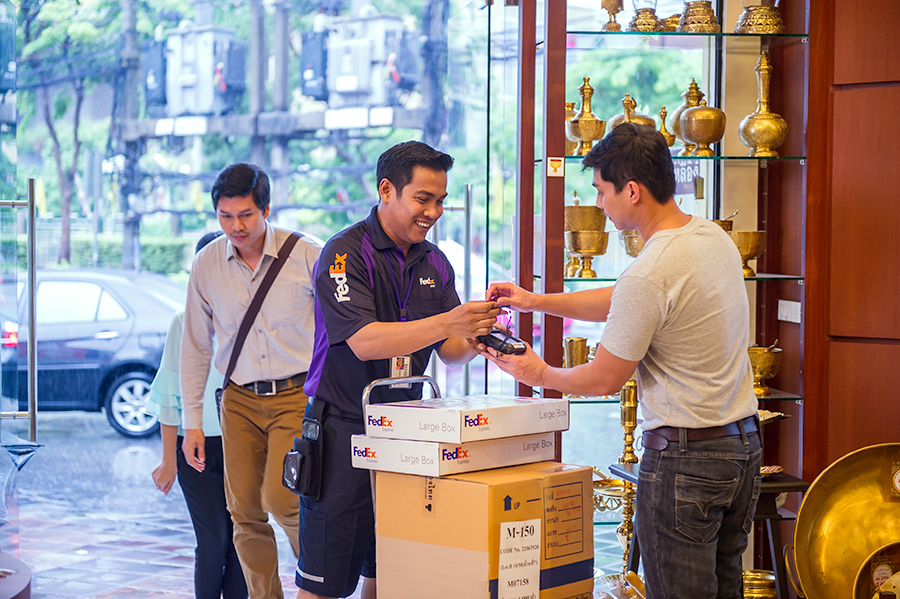
This way, eCFULFILL gets to pass the discount on to the SMEs and their customers - who can look beyond local and introduce their products to more than 220 countries and territories through the extensive global network of FedEx.
Check out how Filipino entrepreneurs are embracing e-commerce as a launchpad into new global markets.
Check out how Filipino entrepreneurs are embracing e-commerce as a launchpad into new global markets.
Of course, the COVID-19 pandemic is powering the growth of e-commerce in Asia and around the globe. In Asia, the region currently represents nearly two-thirds of total global e-commerce spend and has seen the largest growth across markets worldwide in 2020. Even before the pandemic, intra-Asia trade already accounted for 60% of the region’s total exports.
With everyone and everything moving online, SMEs in Asia Pacific are well-positioned to seize this moment and tap the COVID business solutions generated by e-commerce. Small and medium enterprises can leverage their flexibility to expand into the e-commerce space, embracing the necessary digital infrastructure and catering to evolving customer needs in the new normal.
As an SME, there are 3 things you can do to channel the lessons learned from companies like Consummare and eCFULFILL - and truly embrace the e-commerce wave.
With everyone and everything moving online, SMEs in Asia Pacific are well-positioned to seize this moment and tap the COVID business solutions generated by e-commerce. Small and medium enterprises can leverage their flexibility to expand into the e-commerce space, embracing the necessary digital infrastructure and catering to evolving customer needs in the new normal.
As an SME, there are 3 things you can do to channel the lessons learned from companies like Consummare and eCFULFILL - and truly embrace the e-commerce wave.
Identify the right market for your product

While there are plenty of opportunities in the Asia Pacific region, SMEs must adopt a targeted market strategy to ensure more resilient business operations and expansion, at a time of global uncertainty.
For instance, in China, most consumers have switched to e-commerce as their preferred shopping channel. This goes hand-in-hand with China’s massive retail market, set to overtake the U.S. as the world’s largest with US$5.072 trillion in sales.
India, on the other hand, offers early-mover advantage for online retailers. For Indian SMEs, the move to e-commerce is new, but fast-growing. Merchants are moving away from traditional categories like electronics and apparel to more profitable niches, from beauty to personal care to furniture, which offer stronger growth potential.
In a smaller market like Hong Kong, e-commerce is expected to grow by 40% by 2023. As the pandemic continues, the trend of turning to online platforms for shopping and other daily activities is showing no signs of stopping. Peak shipping season in Asia is also growing all the time, with a gauntlet of holidays and festivals that kick off with Double 11 and span local milestones such as White Valentines and Lunar New Year.
For instance, in China, most consumers have switched to e-commerce as their preferred shopping channel. This goes hand-in-hand with China’s massive retail market, set to overtake the U.S. as the world’s largest with US$5.072 trillion in sales.
India, on the other hand, offers early-mover advantage for online retailers. For Indian SMEs, the move to e-commerce is new, but fast-growing. Merchants are moving away from traditional categories like electronics and apparel to more profitable niches, from beauty to personal care to furniture, which offer stronger growth potential.
In a smaller market like Hong Kong, e-commerce is expected to grow by 40% by 2023. As the pandemic continues, the trend of turning to online platforms for shopping and other daily activities is showing no signs of stopping. Peak shipping season in Asia is also growing all the time, with a gauntlet of holidays and festivals that kick off with Double 11 and span local milestones such as White Valentines and Lunar New Year.
Create a seamless digital experience for your customers

Digital transformation, a buzzword from a few years back, has been further accelerated by the pandemic. The right digital infrastructure has created space for SMEs to refine new customer-centric experiences - and hone operational efficiencies.
How your customers experience different touch points will influence their decisions to return. Design of the website, shopping cart checkout process, ease and speed of payment methods are very important for online shoppers. Expectations for convenience are especially high. As an SME, you should consider customizing your online presence. And above all, offer seamless, intuitive navigation that allows for easy search, compare and purchase features.
SMEs are often lauded – and rightly so – for their ability to scale and adapt quickly. Make use of digitalized sales tools. These help minimize administrative costs and errors by automating processes that were once manual.
How your customers experience different touch points will influence their decisions to return. Design of the website, shopping cart checkout process, ease and speed of payment methods are very important for online shoppers. Expectations for convenience are especially high. As an SME, you should consider customizing your online presence. And above all, offer seamless, intuitive navigation that allows for easy search, compare and purchase features.
SMEs are often lauded – and rightly so – for their ability to scale and adapt quickly. Make use of digitalized sales tools. These help minimize administrative costs and errors by automating processes that were once manual.
Leverage innovative cross-border logistics solutions

Don’t forget - the customer journey doesn’t stop at purchase confirmation. Small businesses looking to tap into Asia’s growing cross-border e-commerce market must be able to offer fast and reliable delivery options. Logistics - the gateway between the online and the physical experience - plays a crucial role in ensuring customers are satisfied.
Partnering with the right logistics service provider will help you navigate some of the huddles SMEs struggle with when they first export internationally. From changing border regulations to customs procedures – a logostics partner can help you avoid unexpected delays.
Customers today are more and more eager to know the exact details of delivery – from each step of the journey to precise arrival to the minute. This has prompted logistics providers to introduce innovative solutions to be able to meet these expectations.
The FedEx Delivery Manager allows e-tailers to offer their end-customers more control on how they want their shipments delivered. They can customize their delivery preferences, including time and location, at no extra cost.
Partnering with the right logistics service provider will help you navigate some of the huddles SMEs struggle with when they first export internationally. From changing border regulations to customs procedures – a logostics partner can help you avoid unexpected delays.
Customers today are more and more eager to know the exact details of delivery – from each step of the journey to precise arrival to the minute. This has prompted logistics providers to introduce innovative solutions to be able to meet these expectations.
The FedEx Delivery Manager allows e-tailers to offer their end-customers more control on how they want their shipments delivered. They can customize their delivery preferences, including time and location, at no extra cost.
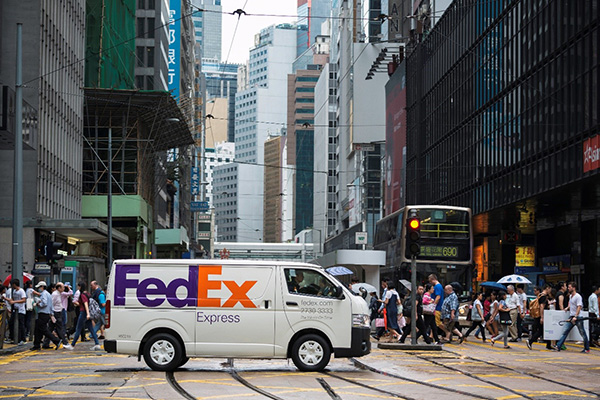
There’s more. Automated shipping tools like FedEx Ship Manager help e-tailers prepare multiple shipments online conveniently and efficiently. For instance, you can calculate the cost of your shipments and transit times quickly. You can also save frequently used information such as addresses for future shipping needs. And finally, FedEx Electronic Trade Documents allow you to submit documents electronically. The advantage? You’ll get a head start on customs clearance, helping to avoid potential delays.
The global e-commerce marketplace is showing no signs of slowing down. SMEs who recognize the opportunities for growth - and adapt quickly to change – will be best-equipped to ride the e-commerce wave.
The global e-commerce marketplace is showing no signs of slowing down. SMEs who recognize the opportunities for growth - and adapt quickly to change – will be best-equipped to ride the e-commerce wave.
LESSON 5: LOOK TO REAL-LIFE SCENARIOS FOR INSPIRATION
Our next lesson is one of pragmatism. The everyday observations we make during our daily routines can actually be the basis for a solid business. For POSH Pocket, it started with a literal pain point - aching feet.
“I loved wearing high heels and I rode the train daily in heels,” shares Nadine, Founder and Creative Director of POSH Pocket Shoes, adding that at the end of the day, she would need to change into flip flops for comfort.
Nadine’s experience sparked the idea to make compact, portable, and stylish foldable flats in the mid-2000s. “I operated our business from my dining table. Social media was just in its early stages and was not the online selling platform it is today. It was a challenge to get our products out there.”
One of the brand’s biggest challenges was logistics management and gaining the trust of potential customers. “At that time, people were skeptical about purchasing products online. We met up with local customers in person. While we mostly cater to the local market, we received a lot of inquiries from other countries so we had to look into international shipping.
“I loved wearing high heels and I rode the train daily in heels,” shares Nadine, Founder and Creative Director of POSH Pocket Shoes, adding that at the end of the day, she would need to change into flip flops for comfort.
Nadine’s experience sparked the idea to make compact, portable, and stylish foldable flats in the mid-2000s. “I operated our business from my dining table. Social media was just in its early stages and was not the online selling platform it is today. It was a challenge to get our products out there.”
One of the brand’s biggest challenges was logistics management and gaining the trust of potential customers. “At that time, people were skeptical about purchasing products online. We met up with local customers in person. While we mostly cater to the local market, we received a lot of inquiries from other countries so we had to look into international shipping.

POSH Pocket Shoes has successfully engaged customers overseas, and is a regular shipper to the United States, Australia, Canada, UAE, and Singapore through FedEx extensive global network.
“It’s exciting to explore the international market. We were surprised that a lot of our customers are very eager to purchase shoes online because they want to support local businesses such as ours.”
For some entrepreneurs, the inspiration to start their businesses comes directly from first-hand experiences or even childhood memories. Anya Lim, the visionary behind ANTHILL Fabric Gallery, was raised by culturally proud Filipino parents who owned a textile business. Anya grew up with bedtime stories about heroes from indigenous groups in the Philippines. Family vacations comprised of visits to local communities and weaving villages.
Anya’s inspiration to start ANTHILL was sparked when she returned to a village in Banaue – mostly known for the rice terraces - in the Philippines which had turned into a ghost town, devoid of the “weaving, carving, and celebration of local culture” that she had enjoyed as a child.
During ANTHILL’s beginnings, local weavers were given little to no mainstream recognition. Traditional patterns were mainly used for furniture and household products. The fate of weaving was uncertain as younger generations were unwilling to inherit the craft.
“It’s exciting to explore the international market. We were surprised that a lot of our customers are very eager to purchase shoes online because they want to support local businesses such as ours.”
For some entrepreneurs, the inspiration to start their businesses comes directly from first-hand experiences or even childhood memories. Anya Lim, the visionary behind ANTHILL Fabric Gallery, was raised by culturally proud Filipino parents who owned a textile business. Anya grew up with bedtime stories about heroes from indigenous groups in the Philippines. Family vacations comprised of visits to local communities and weaving villages.
Anya’s inspiration to start ANTHILL was sparked when she returned to a village in Banaue – mostly known for the rice terraces - in the Philippines which had turned into a ghost town, devoid of the “weaving, carving, and celebration of local culture” that she had enjoyed as a child.
During ANTHILL’s beginnings, local weavers were given little to no mainstream recognition. Traditional patterns were mainly used for furniture and household products. The fate of weaving was uncertain as younger generations were unwilling to inherit the craft.
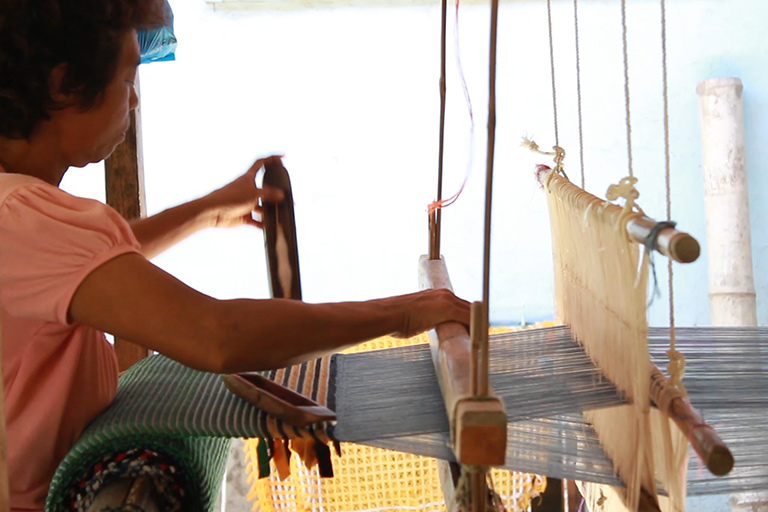
Anya wanted to make sure that ANTHILL would have enough supply before creating the demand and launching the business. The first five years of the enterprise’s operations focused on capacity building. They ensured that their community partners were ready for business. They provided leadership and financial literacy skills training, with the end goal of making the weavers self-reliant.
ANTHILL's first big break came in the form of a partnership with an established local cafe chain where they were tapped to dress their baristas and provide textiles for furniture upholstery. They were featured in the establishment's merchandise section for social enterprises. “This allowed us to grow our visibility in communities like Abra, and gave us credibility,” Anya shares.
Since ANTHILL started, Filipino traditional weaving has made a resurgence. These vibrant patterns are incorporated into apparel, home decor, and other items admired and desired around the world. Today, these products play a key part in Philippine exports with the fashion industry's demand for natural fabrics.
Today, ANTHILL’s biggest market lies in its global customer base, making up 80-90% of sales. Many of these clients, Anya says, are Filipinos living abroad who wish to connect to their roots and wear their identities.
ANTHILL's first big break came in the form of a partnership with an established local cafe chain where they were tapped to dress their baristas and provide textiles for furniture upholstery. They were featured in the establishment's merchandise section for social enterprises. “This allowed us to grow our visibility in communities like Abra, and gave us credibility,” Anya shares.
Since ANTHILL started, Filipino traditional weaving has made a resurgence. These vibrant patterns are incorporated into apparel, home decor, and other items admired and desired around the world. Today, these products play a key part in Philippine exports with the fashion industry's demand for natural fabrics.
Today, ANTHILL’s biggest market lies in its global customer base, making up 80-90% of sales. Many of these clients, Anya says, are Filipinos living abroad who wish to connect to their roots and wear their identities.
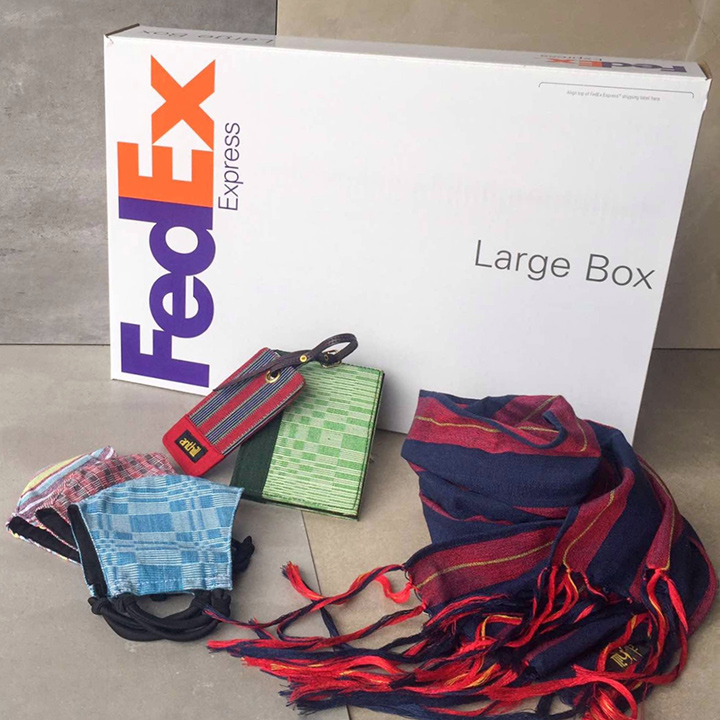
ANTHILL began working with FedEx in 2017. "FedEx has provided tremendous support in our global expansion," Anya says. "Without them, we will not be able to serve our international customers."
ANTHILL has struck up partnerships with businesses in Europe, United States, Hong Kong, and Japan. To better serve them at lower costs, Anya and her team worked with FedEx to consolidate international shipments. "We crunched the numbers and came up with the costs and average rates that will fall within different locations and weight categories. This way, it's a win-win; our clients pay less on shipping, without affecting our bottom line."
ANTHILL has struck up partnerships with businesses in Europe, United States, Hong Kong, and Japan. To better serve them at lower costs, Anya and her team worked with FedEx to consolidate international shipments. "We crunched the numbers and came up with the costs and average rates that will fall within different locations and weight categories. This way, it's a win-win; our clients pay less on shipping, without affecting our bottom line."
LESSON 6: BUILD A BUSINESS AROUND YOUR LOCAL COMMUNITY
Many businesses in Asia continue to be inspired by local traditions – and are always looking for new ways to bring them to the wider world. Often, FedEx is on hand to help partner with those who need support. Small businesses can be the lifeblood of local communities. And yet the smallest businesses or start-ups can be most vulnerable to crises such as natural disasters, extreme weather or – most tellingly – a pandemic.
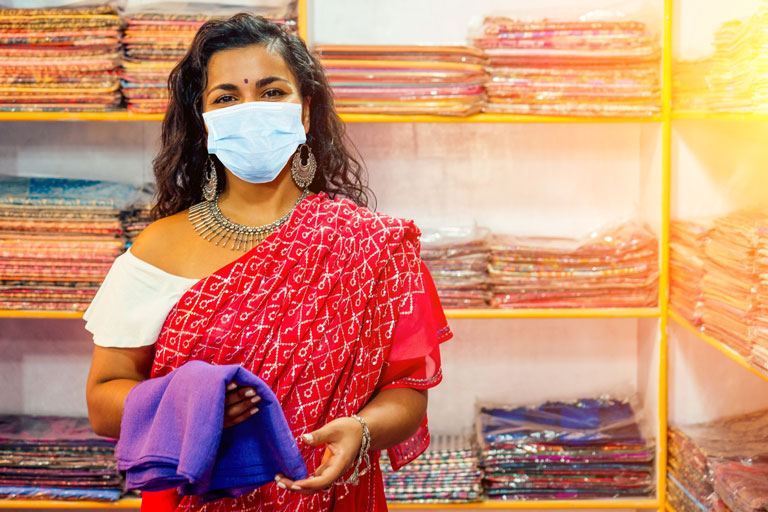
Among the many adverse effects that have resulted from the pandemic, women have been disproportionately affected. (Find out more on how and why women need more support right it’s been widely reported that here).
But what if you’re female, in a low-income group and struggling to keep your business afloat? Chances are you’ll need even more support and guidance to get you through tough economic times.
India is home to 1.3 billion people; around 110 million of these are working for SMEs. And there’s been a rise in female-led or owned SMEs in recent years, thanks to government support. But with only around 14% of MSMEs (micro, small and medium enterprises) majorly owned by women, they still have a long way to go. Many of the businesses cover the range from modest, lone owner-operators selling street-food, fruit, handmade jewelry or incense to larger enterprises aimed at serving women – from beauty services to tailoring, dressmaking and tutoring.
But what if you’re female, in a low-income group and struggling to keep your business afloat? Chances are you’ll need even more support and guidance to get you through tough economic times.
India is home to 1.3 billion people; around 110 million of these are working for SMEs. And there’s been a rise in female-led or owned SMEs in recent years, thanks to government support. But with only around 14% of MSMEs (micro, small and medium enterprises) majorly owned by women, they still have a long way to go. Many of the businesses cover the range from modest, lone owner-operators selling street-food, fruit, handmade jewelry or incense to larger enterprises aimed at serving women – from beauty services to tailoring, dressmaking and tutoring.
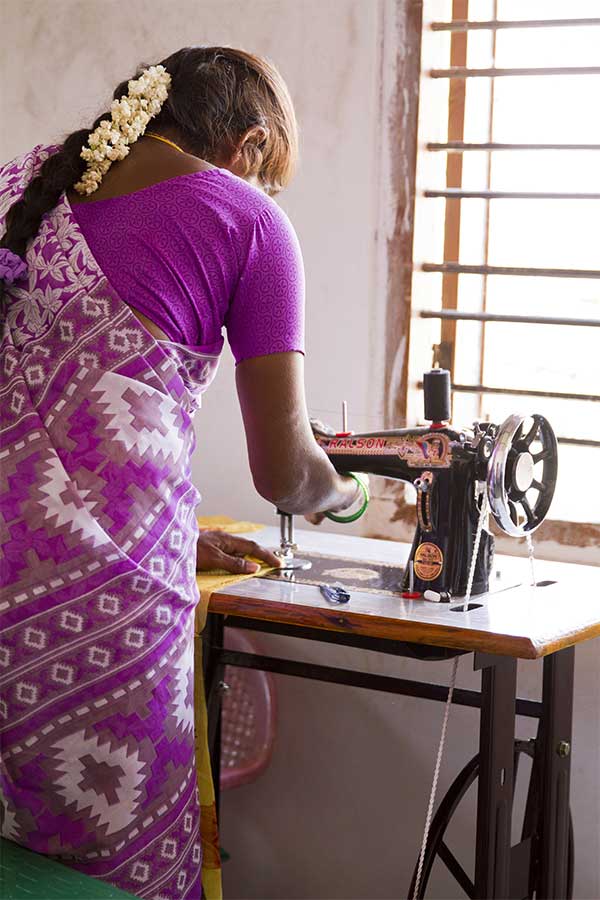
For these small, self-starting SMEs, reliance on regular cash flow, access to steady custom and the ability to offer uninterrupted services is crucial. There’s a delicate balance between operating successfully and struggling to stay afloat – and it can be threatened by even the most minor setbacks.
Huge disruptions to global supply chains and a national lockdown? A recipe for disaster.
At FedEx, we recognize it’s a social and economic priority to provide women and minority entrepreneurs with the tools they need to succeed in times of uncertainty. We recently teamed up with community NGO facilitator United Way Mumbai to ensure that 400 women from lower income groups in India will receive essential support.
To help safeguard vulnerable SMEs, we’re issuing “Saksham” (meaning ‘able’ or ‘capable’ in Hindi) kits, supplied with relevant products to galvanize small businesses impacted by COVID-19. Together, we’re working to identify beneficiaries who have recently been operating a small business and need tools and support to re-start their enterprises and bounce back.
These businesses include home beauty services, tailoring, homemade products such as pickles, dyes, incense sticks and other skills and services. As these women re-establish themselves, raw material suppliers across some of the most impacted communities in India will also benefit from this program. This collaborative approach hopes to have a positive impact on the livelihood of the recipients and their families, helping them to recover from the pandemic.
Huge disruptions to global supply chains and a national lockdown? A recipe for disaster.
At FedEx, we recognize it’s a social and economic priority to provide women and minority entrepreneurs with the tools they need to succeed in times of uncertainty. We recently teamed up with community NGO facilitator United Way Mumbai to ensure that 400 women from lower income groups in India will receive essential support.
To help safeguard vulnerable SMEs, we’re issuing “Saksham” (meaning ‘able’ or ‘capable’ in Hindi) kits, supplied with relevant products to galvanize small businesses impacted by COVID-19. Together, we’re working to identify beneficiaries who have recently been operating a small business and need tools and support to re-start their enterprises and bounce back.
These businesses include home beauty services, tailoring, homemade products such as pickles, dyes, incense sticks and other skills and services. As these women re-establish themselves, raw material suppliers across some of the most impacted communities in India will also benefit from this program. This collaborative approach hopes to have a positive impact on the livelihood of the recipients and their families, helping them to recover from the pandemic.
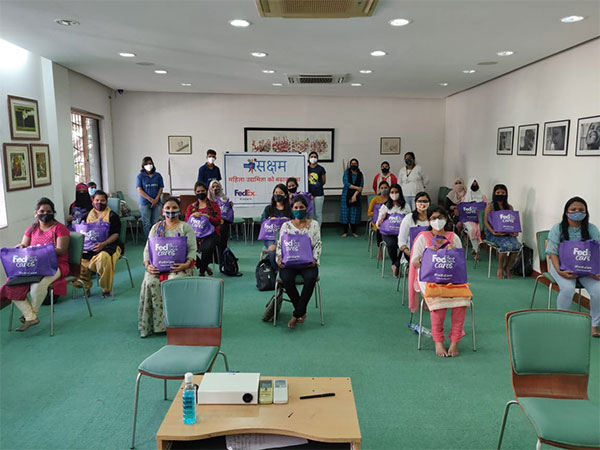
One of our beneficiaries, Madhuri Vishwakarma, provides home beauty services, and was facing financial difficulties after having to stop home visits during the lockdown. She’s now ready to begin her business anew.
Samina Parbez Shaikh, another beneficiary, is the only earning member of her family. She was confronted with overwhelming business challenges arising from lockdown restrictions. Samina’s now on the up: “I am feeling empowered to resume my business. The Saksham kit will help me increase my customer reach.”
Those impacted by the pandemic across Asia and beyond are too numerous to count. But with tight ties to community support and the right guidance, the region’s SMEs are proving nimble in adapting to a new normal.
And for more and more businesses these days, ‘sustainability-led’ and ‘community-conscious’ are becoming real priorities. Purpose-driven commerce is gaining importance – and one that gives back. A great example is Habi Lifestyle.
As part of our commitment to connecting the world responsibly and sustainably, we’re working with Filipino social enterprise Habi Lifestyle to give new life to our old FedEx Cares volunteer shirts.
Habi sustainably repurposes old textiles and garments, producing beautiful, environmentally friendly pouches, cases and other lifestyle items through their Re-Habi initiative. The word ‘Habi’ is Filipino for “weave”.
The enterprise is fully owned by three female social entrepreneurs: Janine Chiong, Paola Savillo, and Bernadee Uy. Together, they guarantee livelihood opportunities for mothers in urban poor communities, empower female artisan weavers in their trade by investing in their continued education, and promote responsible consumption and production by providing wearable solutions.
“We collaborate with corporations to upcycle their materials,“ shares Janine Chiong, General Manager of Habi Lifestyle. “Corporations like FedEx work with us to contribute to provide livelihood to our artisan weavers and enable the cash flow to ensure continuity in our business operations.”
Samina Parbez Shaikh, another beneficiary, is the only earning member of her family. She was confronted with overwhelming business challenges arising from lockdown restrictions. Samina’s now on the up: “I am feeling empowered to resume my business. The Saksham kit will help me increase my customer reach.”
Those impacted by the pandemic across Asia and beyond are too numerous to count. But with tight ties to community support and the right guidance, the region’s SMEs are proving nimble in adapting to a new normal.
And for more and more businesses these days, ‘sustainability-led’ and ‘community-conscious’ are becoming real priorities. Purpose-driven commerce is gaining importance – and one that gives back. A great example is Habi Lifestyle.
As part of our commitment to connecting the world responsibly and sustainably, we’re working with Filipino social enterprise Habi Lifestyle to give new life to our old FedEx Cares volunteer shirts.
Habi sustainably repurposes old textiles and garments, producing beautiful, environmentally friendly pouches, cases and other lifestyle items through their Re-Habi initiative. The word ‘Habi’ is Filipino for “weave”.
The enterprise is fully owned by three female social entrepreneurs: Janine Chiong, Paola Savillo, and Bernadee Uy. Together, they guarantee livelihood opportunities for mothers in urban poor communities, empower female artisan weavers in their trade by investing in their continued education, and promote responsible consumption and production by providing wearable solutions.
“We collaborate with corporations to upcycle their materials,“ shares Janine Chiong, General Manager of Habi Lifestyle. “Corporations like FedEx work with us to contribute to provide livelihood to our artisan weavers and enable the cash flow to ensure continuity in our business operations.”
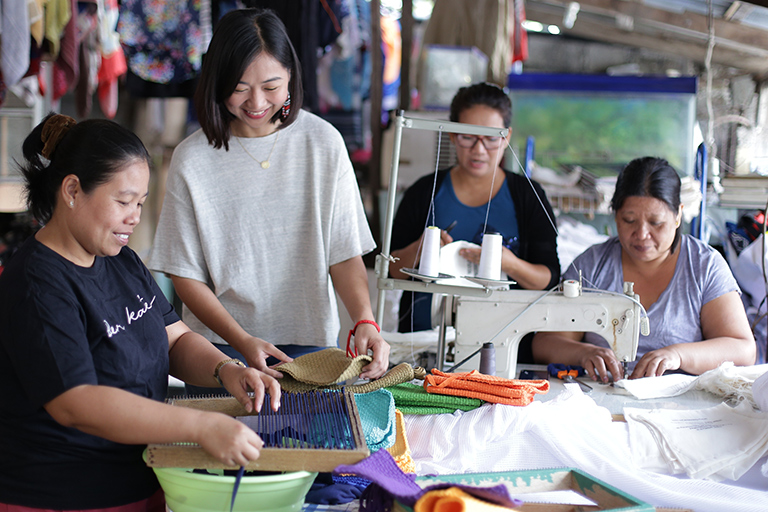
FedEx employees regularly engage in activities to spend time and learnings with the communities where we live and work. We accumulate volunteer shirts from various annual CSR activities and turn them into different lifestyle items as premium corporate gifts for customers. We are proud to create value for our stakeholders – from the local artisan weavers we support to the customers we serve.
We recognize the harm that ‘fast fashion’ has brought on. For us, upcycling old volunteer shirts helps us close the production loop and ensure that scrap materials remain in use.
Collaborating with creative and sustainable enterprises like Habi is a very productive way for us to give back to the environment. We have created opportunities for 30 - 40 local artisan weavers since 2011, and we stand with United Nations’ Sustainable Development Goals to combat poverty and support sustainable cities and communities.
For FedEx, the project supports not only sustainability but also minority-owned small businesses and women entrepreneurs around the world. It’s one way we embrace diversity and inclusion both inside and outside of the company whilst minimizing our environmental footprint.
And many SMEs have recognized that purpose is the path to weathering the pandemic. According to an IBM study, companies without a sense of purpose underperform by 42%. Meanwhile, 40% of consumers worldwide prefer purpose-driven brands.
We recognize the harm that ‘fast fashion’ has brought on. For us, upcycling old volunteer shirts helps us close the production loop and ensure that scrap materials remain in use.
Collaborating with creative and sustainable enterprises like Habi is a very productive way for us to give back to the environment. We have created opportunities for 30 - 40 local artisan weavers since 2011, and we stand with United Nations’ Sustainable Development Goals to combat poverty and support sustainable cities and communities.
For FedEx, the project supports not only sustainability but also minority-owned small businesses and women entrepreneurs around the world. It’s one way we embrace diversity and inclusion both inside and outside of the company whilst minimizing our environmental footprint.
And many SMEs have recognized that purpose is the path to weathering the pandemic. According to an IBM study, companies without a sense of purpose underperform by 42%. Meanwhile, 40% of consumers worldwide prefer purpose-driven brands.
LESSON 7: FIND THE RIGHT LOGISTICS PARTNER THAT UNDERSTANDS YOUR NEEDS
Every business needs a support network. These days, it’s quicker and easier to find a reliable logistics partner with the expertise to help you navigate new cross-border opportunities – and the potential headaches that come with them.
That’s what Xiamen Worthfind did. Right now, the sheer volume of China’s gigantic domestic retail economy is hard to comprehend. The e-commerce market is the largest in the world. But that doesn’t mean businesses are prepared to settle for what’s on their doorstep. On the contrary, Chinese e-commerce brands are tapping into an ever-increasing international customer base, exporting a range of goods to a truly global audience.
That’s what Xiamen Worthfind did. Right now, the sheer volume of China’s gigantic domestic retail economy is hard to comprehend. The e-commerce market is the largest in the world. But that doesn’t mean businesses are prepared to settle for what’s on their doorstep. On the contrary, Chinese e-commerce brands are tapping into an ever-increasing international customer base, exporting a range of goods to a truly global audience.

Being the largest online marketplace in the world isn’t without perks. Constant and swift innovation and highly sophisticated e-commerce models mean China’s retail brands are more than ready to compete with global household names.
And elsewhere in the world, recent cost-cutting measures have meant legacy brands are no longer able to guarantee the service levels or quality that keeps customers coming back. As China rapidly transforms into a global manufacturing power, more Chinese brands are going global.
Since 2014, Xiamen Worthfind have been providing consumer products for real-world travel scenarios, including bags and cases. As a manufacturer and retailer, Worthfind offers the complete matrix of travel items, fashion goods, outdoor supplies and home supplies. With booming market demands and business growth, the company has gradually evolved to combine design, development, brand operation, e-commerce sales and international trade. Based in Fujian, it mainly targets markets in Europe, US, Canada, Japan and Australia.
And elsewhere in the world, recent cost-cutting measures have meant legacy brands are no longer able to guarantee the service levels or quality that keeps customers coming back. As China rapidly transforms into a global manufacturing power, more Chinese brands are going global.
Since 2014, Xiamen Worthfind have been providing consumer products for real-world travel scenarios, including bags and cases. As a manufacturer and retailer, Worthfind offers the complete matrix of travel items, fashion goods, outdoor supplies and home supplies. With booming market demands and business growth, the company has gradually evolved to combine design, development, brand operation, e-commerce sales and international trade. Based in Fujian, it mainly targets markets in Europe, US, Canada, Japan and Australia.
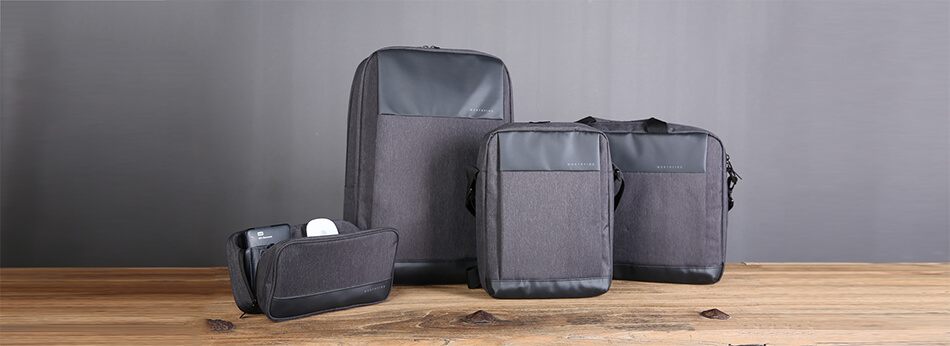
Access to overseas markets have been especially critical to Worthfind’s success. However, cross-border logistics challenges have slowed the company’s international expansion. The company encountered challenges that will be familiar to any cross-border business: uncontrollable sea-air shipments and different delivery efficiencies in peak and low seasons.
All cross-border companies want a solid logistics partnership. Allying with a highly efficient logistics enterprise - with a proven worldwide delivery network beyond domestic capability - is crucial if you are serious about acquiring market share in new geographies.
Since 2015, Worthfind has leaned on FedEx global reach and reliability. In today’s world, with customer expectations and need for speed at an all-time high, the ability to offer 1-3 working day deliveries anywhere in the world is a must-have for modern businesses. At FedEx, that’s the norm.
With a focus on market trends, rapid response and popular products, Worthfind has been chasing industry breakthroughs. The COVID-19 pandemic in early 2020 led to a sharp drop in brick-and-mortar stores. A mass change in consumer behavior rooted in a fundamental need to stay at home spurred online traffic and sales.
Despite the decline in traditional export trade, cross-border e-commerce is experiencing an unexpected growth. Worthfind sees huge potential in cross-border e-commerce in the post-pandemic era, and is looking to further expand into overseas markets with force. Other companies, undoubtedly, are following suit.
Recently, FedEx has flexed our approach in response to new customs policies introduced by the Chinese government to promote cross-border e-commerce. Upgraded export delivery services for international e-commerce enables smoother, easier shipping for SME customers. Benefits include simplified application procedures, paperless customs declaration and one-stop registration. Goods exported through cross-border e-commerce operators are prioritized during inspection and assured with fast customs clearance.
“Cross-border e-commerce operators and logistical enterprises like FedEx depend on each other,” believes Worthfind’s Zhou Xiaoming. Put simply, facilitating transactions between e-commerce operators and end consumers drives a fast and simple consumer experience. A seamless, trustworthy customer journey is what counts.
All cross-border companies want a solid logistics partnership. Allying with a highly efficient logistics enterprise - with a proven worldwide delivery network beyond domestic capability - is crucial if you are serious about acquiring market share in new geographies.
Since 2015, Worthfind has leaned on FedEx global reach and reliability. In today’s world, with customer expectations and need for speed at an all-time high, the ability to offer 1-3 working day deliveries anywhere in the world is a must-have for modern businesses. At FedEx, that’s the norm.
With a focus on market trends, rapid response and popular products, Worthfind has been chasing industry breakthroughs. The COVID-19 pandemic in early 2020 led to a sharp drop in brick-and-mortar stores. A mass change in consumer behavior rooted in a fundamental need to stay at home spurred online traffic and sales.
Despite the decline in traditional export trade, cross-border e-commerce is experiencing an unexpected growth. Worthfind sees huge potential in cross-border e-commerce in the post-pandemic era, and is looking to further expand into overseas markets with force. Other companies, undoubtedly, are following suit.
Recently, FedEx has flexed our approach in response to new customs policies introduced by the Chinese government to promote cross-border e-commerce. Upgraded export delivery services for international e-commerce enables smoother, easier shipping for SME customers. Benefits include simplified application procedures, paperless customs declaration and one-stop registration. Goods exported through cross-border e-commerce operators are prioritized during inspection and assured with fast customs clearance.
“Cross-border e-commerce operators and logistical enterprises like FedEx depend on each other,” believes Worthfind’s Zhou Xiaoming. Put simply, facilitating transactions between e-commerce operators and end consumers drives a fast and simple consumer experience. A seamless, trustworthy customer journey is what counts.
The bottom line? From crisis springs opportunity
There are so many learnings to be drawn from the stories of these Asia Pacific SMEs – as well as inspiration. Whether you’re selling a physical product like shoe-sellers Christy Ng and POSH Pocket Shoes - or providing a technology solution for e-tailers like eCFULFILL, what takeaways can help your business thrive?
From Manila to Mumbai; Hong Kong to Singapore, for SMEs it’s perseverance and the ability to flex their business. This can be making the jump from traditional to online retail; or learning to pivot product offering fast in response to shifting consumer trends or behavior.
Being able to adapt in the face of COVID-19 headwinds has been a hugely defining breakthrough for many SMEs, as it proves that their business model – given some agility – can withstand tough times.
For example, the female-operated Consummare believe resilience and resourcefulness are essential, especially during a crisis. Consummare suspended operations during local lockdowns to ensure safety of their employees. Yco and her team were able to keep the business running and acquire new projects by working from home. Consummare used the downtime to send out samples to key clients, ensuring they stayed front-of-mind during a chaotic period for many.
POSH Pocket Shoes is working hard to recover from the impact of COVID-19. Last March, owner Nadine had to close down their brick and mortar shop to protect their customers and employees. With less people opting to shop at physical stores, the ability of businesses to make home deliveries efficiently has become a key driver for customer’s purchase decisions. Nadine shares that they continue to expand their offerings with more styles, an in-house line of bags and accessories, and shoes for children.
ANTHILL maintained their business margins by creating new products in response to the global crisis. The social enterprise had booked several popups in Manila and trade shows in the US, and was all set with procurement and production. When the pandemic ripped through the global economy, Anya and her team had to find other ways to support their partner communities.
“We cut down our revenue channels. From four revenue channels, we went down to two. We used to do uniforms for hotels and schools, but that side of the business stopped. Our face masks and our online channel became the bloodline of our business. We were also left with a lot of fabric because of the cancelled events, so we started selling them online as well.” The majority of ANTHILL orders during the pandemic have been bulk purchases of masks to US clients, who then proceed to resell them in their respective stores.
“Aside from masks, we’re also looking at home essentials, ‘Zoom’ attire for those who work from home, and Christmas decor,” shares Lim. “We are eager to collaborate with brands and designers abroad who will have the demand for our fabrics.”
No matter what industry you’re in, ANTHILL’s advice - protect the safety of your employees, shut down revenue streams that are no longer relevant and tap into the zeitgeist to deliver what people fundamentally need – is sound. And business tips are everywhere you look – from emergent trends regularly shared on social media to dedicated online hubs offering small business advice on everything from proper packaging to customs clearance.
At FedEx, we’re ready to help. Our network is built for what’s next. Our experience in helping small and medium enterprises go global means we can help craft the right solutions for your business, too – whatever growth stage you’re at. That includes tips on how to navigate COVID business solutions in the wake of a global pandemic.
Small business owners can also visit our dedicated COVID-19 support hub for guidance on business recovery throughout the region. And finally - don’t forget to follow us on LinkedIn for tips, advice and best practices on how you can build business resilience and tap new possibilities in our dynamic economic landscape.
From Manila to Mumbai; Hong Kong to Singapore, for SMEs it’s perseverance and the ability to flex their business. This can be making the jump from traditional to online retail; or learning to pivot product offering fast in response to shifting consumer trends or behavior.
Being able to adapt in the face of COVID-19 headwinds has been a hugely defining breakthrough for many SMEs, as it proves that their business model – given some agility – can withstand tough times.
For example, the female-operated Consummare believe resilience and resourcefulness are essential, especially during a crisis. Consummare suspended operations during local lockdowns to ensure safety of their employees. Yco and her team were able to keep the business running and acquire new projects by working from home. Consummare used the downtime to send out samples to key clients, ensuring they stayed front-of-mind during a chaotic period for many.
POSH Pocket Shoes is working hard to recover from the impact of COVID-19. Last March, owner Nadine had to close down their brick and mortar shop to protect their customers and employees. With less people opting to shop at physical stores, the ability of businesses to make home deliveries efficiently has become a key driver for customer’s purchase decisions. Nadine shares that they continue to expand their offerings with more styles, an in-house line of bags and accessories, and shoes for children.
ANTHILL maintained their business margins by creating new products in response to the global crisis. The social enterprise had booked several popups in Manila and trade shows in the US, and was all set with procurement and production. When the pandemic ripped through the global economy, Anya and her team had to find other ways to support their partner communities.
“We cut down our revenue channels. From four revenue channels, we went down to two. We used to do uniforms for hotels and schools, but that side of the business stopped. Our face masks and our online channel became the bloodline of our business. We were also left with a lot of fabric because of the cancelled events, so we started selling them online as well.” The majority of ANTHILL orders during the pandemic have been bulk purchases of masks to US clients, who then proceed to resell them in their respective stores.
“Aside from masks, we’re also looking at home essentials, ‘Zoom’ attire for those who work from home, and Christmas decor,” shares Lim. “We are eager to collaborate with brands and designers abroad who will have the demand for our fabrics.”
No matter what industry you’re in, ANTHILL’s advice - protect the safety of your employees, shut down revenue streams that are no longer relevant and tap into the zeitgeist to deliver what people fundamentally need – is sound. And business tips are everywhere you look – from emergent trends regularly shared on social media to dedicated online hubs offering small business advice on everything from proper packaging to customs clearance.
At FedEx, we’re ready to help. Our network is built for what’s next. Our experience in helping small and medium enterprises go global means we can help craft the right solutions for your business, too – whatever growth stage you’re at. That includes tips on how to navigate COVID business solutions in the wake of a global pandemic.
Small business owners can also visit our dedicated COVID-19 support hub for guidance on business recovery throughout the region. And finally - don’t forget to follow us on LinkedIn for tips, advice and best practices on how you can build business resilience and tap new possibilities in our dynamic economic landscape.
***
-
Previous
 3 Ways SMEs Can Make The Most Of
3 Ways SMEs Can Make The Most Of
E-Commerce Opportunities In Asia -
NextEntrepreneurship And Growth Opportunities From An Early Age













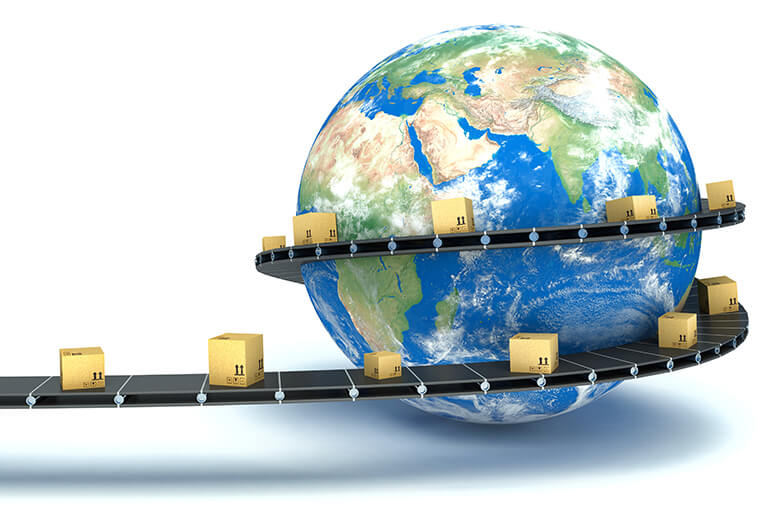



 The Latest
The Latest